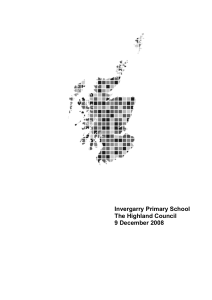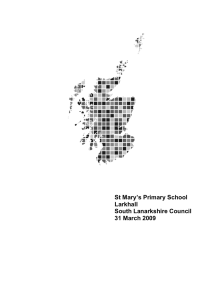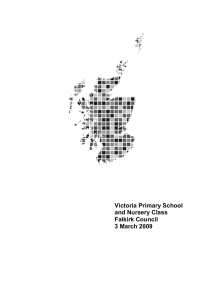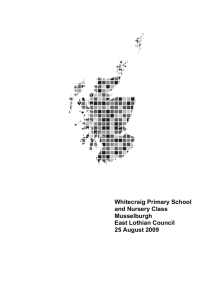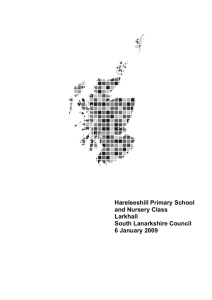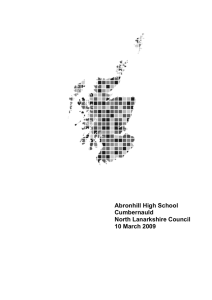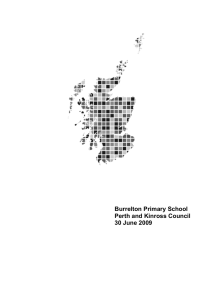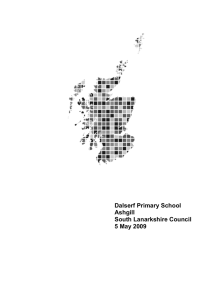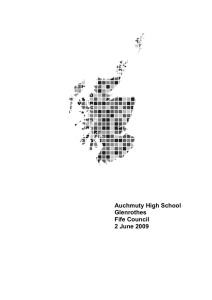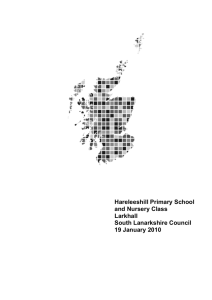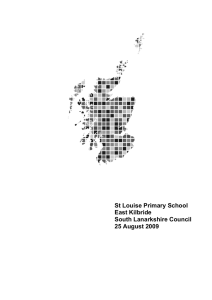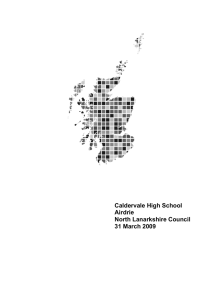Canberra Primary School East Kilbride South Lanarkshire Council
advertisement
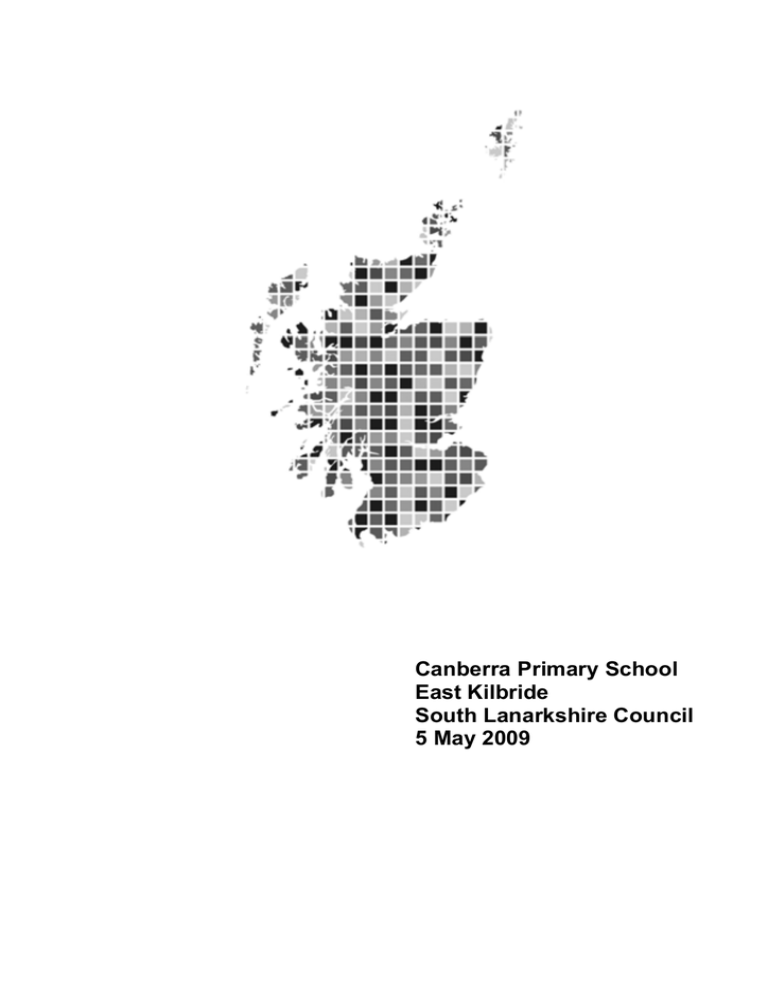
Canberra Primary School East Kilbride South Lanarkshire Council 5 May 2009 This report tells you about the quality of education at the school1. We describe how children benefit from learning there. We explain how well they are doing and how good the school is at helping them to learn. Then we look at the ways in which the school does this. We describe how well the school works with other groups in the community, including parents2 and services which support children. We also comment on how well staff and children work together and how they go about improving the school. Our report describes the ‘ethos’ of the school. By ‘ethos’ we mean the relationships in the school, how well children are cared for and treated and how much is expected of them in all aspects of school life. Finally, we comment on the school’s aims. In particular, we focus on how well the aims help staff to deliver high quality learning, and the impact of leadership on the school’s success in achieving these aims. If you would like to learn more about our inspection of the school, please visit www.hmie.gov.uk. Here you can find analyses of questionnaire returns. Where applicable, you will also be able to find descriptions of good practice in the school. 1 2 The term ‘school’ is used to include the work of the nursery class, where relevant. Throughout this report, the term ‘parents’ should be taken to include foster carers, residential care staff and carers who are relatives or friends. Contents 1. The school 2. Particular strengths of the school 3. Example of good practice 4. How well do children learn and achieve? 5. How well do staff work with others to support children’s learning? 6. Are staff and children actively involved in improving their school community? 7. Does the school have high expectations of all children? 8. Does the school have a clear sense of direction? 9. What happens next? 1. The school Canberra Primary School is a non-denominational school. It serves the areas of Hairmyres, Newlandsmuir and Westwood in East Kilbride. The roll was 204 when the inspection was carried out in February 2009. Pupils’ attendance was in line with the national average in 2007/2008. The headteacher was absent at the time of the inspection. A headteacher from another school had been providing valuable management support to the school over the past two weeks. 1 2. Particular strengths of the school • Polite, confident and friendly children who are keen to learn. • Approaches to health promotion and to developing citizenship. • The wide range of experiences for children to achieve during school and out-of-school hours. 3. Example of good practice • Developing children’s citizenship through the ‘Junior Football Referees’ programme. 4. How well do children learn and achieve? Learning and achievement The school is taking effective steps to promote children’s wider achievements. Children are making very good progress in developing personal and social skills. At P7, they benefit from taking part in a residential experience that successfully promotes their confidence and independence. They are developing a very good understanding of citizenship by acting as ‘buddies’, monitors and football referees. Children show responsible attitudes when taking on the role of peer mediators to help settle any disagreements in the playground. Across the school, children understand the importance of being healthy and active and know how to keep themselves safe. In physical education and drama activities, most children follow instructions carefully and perform with confidence. Children are making good progress in 2 mathematics and satisfactory progress in reading, listening and talking. Their progress in writing is weak. Most children listen well to adults and respond appropriately in carrying out instructions. They are less skilled at listening to each other and in taking turns when working in groups. The majority of children read well and talk enthusiastically about their favourite books and authors. The good rate of progress they make in reading at the early stages is not always maintained as they move through the school. Children have regular opportunities to write for a variety of purposes. However, a significant number of children are capable of achieving higher levels of attainment in writing. In mathematics, most children are confident in number work. They know about the features of a range of shapes. Across the school, children are developing good skills in problem solving. They do not make enough use of information and communications technology (ICT) to collect and display information on databases and spreadsheets. Curriculum and meeting learning needs The school is at the early stages of developing the curriculum in line with the national initiative, Curriculum for Excellence. Teachers are beginning to plan projects and topics that link between different areas of learning. They are working towards providing two hours of physical education each week for all children. Staff provide children with good opportunities to develop their skills in art and in learning German. They now need to develop more ways for children to use their literacy, numeracy and ICT skills in other areas of the curriculum. At the early stages, staff have introduced learning experiences designed to encourage children to be active in their learning. These activities are not always successful in supporting and extending children’s learning. Children are enthusiastic when they are given responsibility for aspects of their own learning and most work together well in pairs and small groups. Staff should build on and extend this practice at all stages. 3 Children’s learning needs are not being well met. Learning activities are not always well matched to meet the needs of all children. Staff do not provide higher-achieving children with a suitable level of challenge. There are major weaknesses in the school’s approaches to supporting vulnerable children and those who are having difficulties with their learning. The requirements of a few children with significant additional support needs are met more effectively. However, class teachers, parents and children are not involved consistently in planning children’s individualised educational programmes (IEPs). Learning targets within IEPs do not always match well to the particular skills the child needs to develop. Most teachers give clear explanations and instructions and share the general purpose of lessons with children. Most use questioning well to check children’s understanding. Overall, learning activities rely too heavily on the use of textbook and worksheet exercises. Children do not get enough opportunities to be actively involved in lessons. They are not always aware of their own strengths as learners and how to improve their work. Homework is regular but it lacks variety. 5. How well do staff work with others to support children’s learning? The Parent Council is supportive of the school and is involved in organising coffee mornings and fundraising events. Parents help on school trips and assist children in the early years in the activity room. Staff keep parents informed of their children’s progress through annual progress reports. However, parents feel that current arrangements for parents’ evenings do not allow sufficient time for them to talk to staff about their children. There is scope to take more account of parents’ views and to provide them with better information on the work of the school. Staff have established helpful links with professional agencies and community groups. The Active Schools Co ordinator and the local sports centre provide children with a variety of stimulating sporting activities. The school chaplain supports the school well and leads regular assemblies. The school has effective arrangements to help children move confidently and successfully from P7 to Duncanrig 4 Secondary School. There are appropriate arrangements to deal with complaints or concerns from children and parents. 6. Are staff and children actively involved in improving their school community? Children who have responsibilities as junior road safety officers, members of the pupil council and eco group make helpful suggestions to improve the school and bring children’s ideas to the attention of school staff. Overall, the range of opportunities for all children to help improve the school community could be developed further. Teaching and support staff do not work together effectively to support the work of the school and staff morale is low. Individually, staff are committed to making improvements for learners but there is no shared sense of purpose or teamwork to help bring about the necessary changes. Arrangements for improvement planning are leading to some improvements in the school, for example in health promotion and developing the curriculum. These need to be reviewed to improve further children’s attainment and learning experiences. 7. Does the school have high expectations of all children? Children are confident, polite and almost all are well behaved. They feel safe, happy and well cared for in school and are confident that any incidents involving bullying will be dealt with well. Children’s achievements are valued and celebrated. Their successes are recognised in attractive displays all around the school. The school gives good attention to promoting healthy living. It has won a Silver Award for health promotion and is working towards gold level. Regular assemblies provide very good opportunities for religious observance. Staff meet most children’s health, emotional and social needs well and are clear about their responsibilities for child protection. There are appropriate procedures in place to monitor and encourage children’s attendance at school. Teachers are developing a range of learning experiences to promote equality and fairness to assist children in 5 recognising and tackling discrimination. 8. Does the school have a clear sense of direction? The depute head teacher and acting principal teacher work very hard to provide support to the headteacher. They are respected by staff and children alike. The acting principal teacher has developed the school’s successful approach to health promotion. Senior managers look at teachers’ plans, track children’s attainment and monitor the quality of children’s work. They do not make effective use of the information to improve learning and teaching. Staff recognise the need to improve children’s attainment and meet learning needs more effectively but need clear direction and encouragement to achieve this. The school’s approaches to self-evaluation are weak and leadership for learning at all levels requires significant improvement. 9. What happens next? We will carry out a follow-through inspection visit within one year of publication of this report and will report to parents on the extent to which the school has improved. Following that visit, we may continue to check the improvements the school has made. We may also carry out a second follow-through inspection within two years of the original inspection report. If a second follow-through inspection visit is necessary then it will result in another report to parents on the extent of improvement that the school has made. 6 We have agreed the following areas for improvement with the school and education authority. • Raise attainment in English language and mathematics. • Involve children more actively in learning and give them more responsibility for their own learning. • Provide children with appropriate levels of challenge and support to meet their needs more effectively. • Improve communication and partnerships with parents. • Improve teamwork, leadership for learning at all levels and the school’s approaches to self-evaluation. 7 Quality indicators help schools and nursery classes, education authorities and inspectors to judge what is good and what needs to be improved in the work of a school and a nursery class. You can find these quality indicators in the HMIE publications How good is our school? and The Child at the Centre. Following the inspection of each school, the Scottish Government gathers evaluations of three important quality indicators to keep track of how well all Scottish schools and nursery classes are doing. Here are the evaluations for Canberra Primary School. Improvements in performance Learners’ experiences Meeting learning needs satisfactory satisfactory unsatisfactory We also evaluated the following aspects of the work of the school The curriculum Improvement through self-evaluation HM Inspector: Lesley A. Allan 5 May 2009 8 satisfactory weak To find out more about inspections or get an electronic copy of this report go to www.hmie.gov.uk. Please contact the Business Management and Communications Team (BMCT) if you wish to enquire about our arrangements for translated or other appropriate versions. If you wish to comment about any of our inspections, contact us at HMIEenquiries@hmie.gsi.gov.uk or alternatively you should write in the first instance to BMCT, HM Inspectorate of Education, Denholm House, Almondvale Business Park, Almondvale Way, Livingston EH54 6GA. Our complaints procedure is available from our website www.hmie.gov.uk or alternatively you can write to our Complaints Manager, at the address above or by telephoning 01506 600259. If you are not satisfied with the action we have taken at the end of our complaints procedure, you can raise your complaint with the Scottish Public Services Ombudsman (SPSO). The SPSO is fully independent and has powers to investigate complaints about Government departments and agencies. You should write to SPSO, Freepost EH641, Edinburgh EH3 0BR. You can also telephone 0800 377 7330, fax 0800 377 7331 or e-mail: ask@spso.org.uk. More information about the Ombudsman’s office can be obtained from the website at www.spso.org.uk. This report uses the following word scale to make clear judgements made by inspectors. excellent very good good satisfactory weak unsatisfactory outstanding, sector leading major strengths important strengths with some areas for improvement strengths just outweigh weaknesses important weaknesses major weaknesses Crown Copyright 2009 HM Inspectorate of Education
